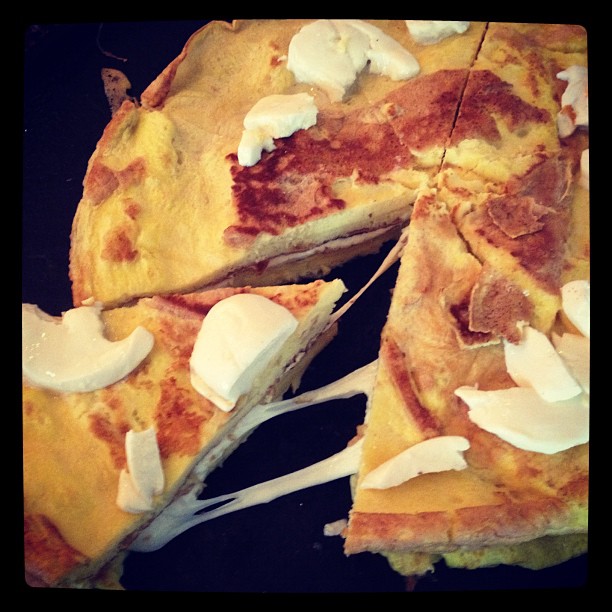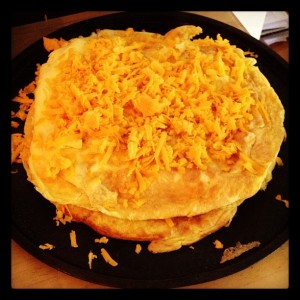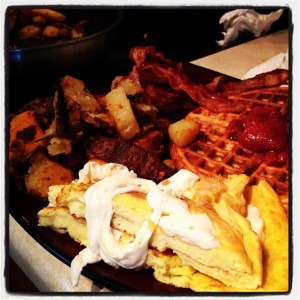Intermittent fasting has taken over the diet and nutrition world. And fast. (Sweet pun.) As I write this, I’m experimenting with the Warrior Diet — a fasting strategy that revolves around eating one meal per day. And as I look back, just two years ago I lived and died by eating six small meals per [...]
 Intermittent fasting has taken over the diet and nutrition world.
Intermittent fasting has taken over the diet and nutrition world.
And fast. (Sweet pun.)
As I write this, I’m experimenting with the Warrior Diet — a fasting strategy that revolves around eating one meal per day.
And as I look back, just two years ago I lived and died by eating six small meals per day.
These days, everyone is quick to write and talk about the methods and research behind fasting.
But what’s often overlooked is the most fundamental part of the journey: how to start.
How I started
I wish I has a grand story detailing the hardships I faced when starting intermittent fasting, but, sadly, I don’t. My fasting journey didn’t blossom from a grand experiment (like most of my interests do), it blossomed from necessity.
After breaking my foot during a tricking session, I was on crutches for two months. Being a phys ed teacher, this sucked. My days consisted of crutching back and forth between the weight room, the gymnasium, my office, the lunch room, and the rest of the school grounds. The broken foot became immeasurably swollen inside of its cast and my healthy foot quickly became overworked and just as painful. So the hours I wasn’t working, I was on the couch hating life. And I would starve before I could motivate myself to endure the discomfort of hopping around to cook a meal. Bye bye breakfast.
It was tough. I loved breakfast. Hell, to this day I love breakfast. One of my favorite cheat day feasts is cooking a monster breakfast. Not to mention, omelettes are my favorite food. Back in my younger days, when I worked at 5:00AM, I awoke at 4:00AM just to cook and eat breakfast because I couldn’t live without it.
Now, of course, I live without it. Regularly. And even to the point of only eating once in an entire day. Here’s how you can too.
Fasting gurus
It would be a sham if I didn’t mention Martin Berkhan, Brad Pilon, Ori Hofmekler, and John Romaniello. All four of them have influenced my fasting habits, and I’ve experimented with each of their methods.
And I guess I should also preface with this: I’m not saying intermittent fasting, eating once per day, or doing any of this stuff is necessary. People have seen results for years following principles in stark contrast to intermittent fasting. It’s just like GOMAD and other nutritional tools. It’s right for some, not everyone.
Although I’m going to detail more reasons in the follow-up to this post, I fast because it fits my lifestyle. Through experimentation, I found that I’m ultra productive during a fast. And the past week — my dive into eating only one meal per day — has shown encouraging performance and physique benefits.
The logistics
Breakfast eaters and frequent feeders see fasting as a daunting task. They hate hunger from a comfort and state-of-mind standpoint.
Despite some puported benefits of fasting (boosting growth hormone, being better for body recomposition), one that’s now widely accepted is that the body doesn’t eat your muscles away to nothingness in times of hunger. And to start fasting, hunger is truly the only hurdle.
So if you want to fast, first assure yourself that you won’t starve to death and that you will indeed feed and live another day. This is difficult, as both hunger and eating patterns are ingrained behaviors and you’re violating your “set” internal feeding clock.
But the body is adaptable. It will change its interworkings to better deal with hunger if it has to. And so the first step to fasting is adopting the right mindset. This is kind of like a self-fulfilling prophecy. William Thomas, a now deceased sociologist, has his own theorem that says: If men define situations as real, they are real in their consequences. If you’re one minute into a fast, suffering from hunger, convincing yourself of impossibility, and obsessing over food, you’re not going to get very far. Just try to relax and tell yourself that eating isn’t a big deal and that you won’t starve to death.
The natural fasting progression
 Start with Martin Berkhan’s 16/8 scheme. The numbers 16 and 8 stand for the fast and feast durations, so you fast for 16 hours and feast for 8. Most opt to break the fast at 12:00PM and eat until 8:00PM, but you can move the eight hour window to better fit your lifestyle. Just don’t hop around. If you pick 12:00PM – 8:00PM, stick with it daily.
Start with Martin Berkhan’s 16/8 scheme. The numbers 16 and 8 stand for the fast and feast durations, so you fast for 16 hours and feast for 8. Most opt to break the fast at 12:00PM and eat until 8:00PM, but you can move the eight hour window to better fit your lifestyle. Just don’t hop around. If you pick 12:00PM – 8:00PM, stick with it daily.
Keep in mind, however, if you eat breakfast at 7Am, your last meal will be at 3PM. And people struggle sleeping on an empty stomach, usually succumb to snacking. That’s why most people prefer the 12:00PM – 8:00PM window.
If you wake up at 7:00AM and break the fast at 12:00PM, you’re only fasting for about five waking hours But for people that live for breakfast, this will be an eternity.
You can conquer these five hours by going cold turkey. But just like smoking, few people can handle it. Here are some alternatives.
The best way to forget about hunger is to literally put yourself in a position to forget about hunger. Keep active during your fasting window and put yourself in a situation where you can’t eat. Hell, sleep in if you have to.
Before I truly began intermittent fasting, I was student-teaching under a teacher that didn’t eat lunch. So I got used to eating a big breakfast, having nothing but an apple for lunch, coming home and lifting, and then having a bigger dinner. I didn’t have a choice. Not exactly intermittent fasting, but I was forced to alter my eating patterns around my schedule.
So if there’s a way — if even for a day — you can force yourself to go without eating during your fasting window, you’ll see that it’s not so bad. It makes future fasts easier.
In this same line, schedule a ton of things to do. The day of my first ever 24+ hour fast went like this: I slept in, golfed, lifted, and then went to batting practice. It was 7:00PM before I even thought about food. A cup of herbal tea went down the hatch, a few episodes of The Office entertained my brain, my head hit the pillow, and food never glitched my radar.
Subtle tricks
Back in March, I met John Romaniello at the Arnold Sports Festival. Knowing John was a fasting proponent, I tried sparking a conversation about coffee because nearly every fasting guru is a coffee addict. The punchline here is that John doesn’t drink coffee and my conversation starter was shot down, but the reality is still that most fasters are coffee drinkers because it (along with teas) can blunt hunger.
But you have to be cautious with sugars and creams as technically these negate the whole premise of fasting. And you also have to monitor how caffeine affects the quality of your sleep.
Another hunger helper is sugar-free gum. Although I’m not a huge fan of gum, it has saved me during a few longer duration fasts. Just make sure you test out different brands. Some gums tend to get “hard” quickly, which is like making your jaws do squats for hours.
Another trick: chew on and eat ice cubes. Cheesy, but it works.
For those hardcore breakfast eaters, try adding whey into your morning coffee (as a creamer of sorts, I can give the “recipe” to those that want it). This prolongs it’s hunger busting effects even though it negates the whole nutrient deprivation part of the fast. It’s a useful beginner trick, but don’t get addicted. Know the means to the end. (It is delicious though.)
Lastly, if you’re struggling with a 16/8 fasting scheme, suck it up. If you wake up at 6:00AM, you’re only fasting until 12:00PM. That’s six hours without food. How spoiled are you? Grab some haunches and just do it. If you can’t survive six hours without sustenance, how do you expect to survive the zombie attack?
The 24 hour fast
After adapting to the 16/8 fasting regime, pushing your hunger boundaries is easier. You may never want or need to fast for 24 hours. But in the name of experimentation, I think everyone should. For the record, a 24 hour fast isn’t a full day fast. It’s a 24 hour fast from your last meal. So if you eat dinner at 7:00PM, you wouldn’t eat again until 7:00PM the next day.
When it comes to fasting, I sometimes see myself as Kramer in “The Dealership” episode of Seinfeld — seeing how far I can drive a car that’s listing empty on the fuel tank. (My fasting record is 46 hours.)
24 hour fasts are mentally challenging. But here are some GameGenie codes. (And don’t forget the the “Subtle Tricks” section above.)
 For a first ever 24 hour fast, eat a bigger “cheat-y” meal the day prior. Not only will you be fuller longer, but you will give yourself some psychological backing to justify your fast. For example, “I ate slop yesterday, so I’m fasting today.” It’s an admittedly unhealthy mindset, but it works. (Note: this is somewhat like John Romaniello’s Feast-Fast method, although he recommends a longer fast.)
For a first ever 24 hour fast, eat a bigger “cheat-y” meal the day prior. Not only will you be fuller longer, but you will give yourself some psychological backing to justify your fast. For example, “I ate slop yesterday, so I’m fasting today.” It’s an admittedly unhealthy mindset, but it works. (Note: this is somewhat like John Romaniello’s Feast-Fast method, although he recommends a longer fast.)
The downside: If you’re aiming to cut calories, this “cheat meal” neglects the benefits of the 24 hour fast by filling up on them the day prior. Use it as an introductory technique to transition your body into longer bouts of hunger.
The best way to break into 24 hour fasts has nothing to do with coffees, teas, cheat meals, or any “special” modality. No, the best way is to simply adjust your feeding schedule.
The wrong way to handle a 24 hour fast is to have your last meal at 8:00PM the night prior. This means you have to survive all morning, all afternoon, and into the evening without food. That’s a long day. Fix it with these two tweaks.
First, eat your last meal at 3:00PM – 5:00PM the day prior to the fast. You will spend more waking hours full. Eating at 8:00PM means sleeping on a full stomach. Sleeping on a full stomach wastes waking hours of satiety. By moving the meal to 5:00PM, hunger is moot for the rest of the day and the fast is broken earlier the following day.
Second, make that 3:00PM – 5:00PM two meals combined into one. So if you’re used to eating at 12:00PM, 4:00PM, and 8:00PM, combine the 8:00PM meal with the 4:00PM meal. You’re eating the same amount of calories and the increased satiety will carry into the night and morning.
It shakes out like this: Wake up, 12PM meal, 4PM meal (combination 4PM and 8PM meal), start fast, sleep, wake up, 4PM (one meal), sleep.
Beyond 24 hours
Fasting beyond 24 hours is an adventure. If you have the psyche and dedication, you can pull-through using the same strategies above. But it’s is less about secret tactics and more about commitment.
For a long time I fasted 40+ hours every week (and actually saw gains). It was per John Romaniello’s Feast-Fast method, which is basically the strategy I listed for those struggling with 24 hour fasts: having a large cheat meal the day prior. But my cheat meal was very cheat-y and the fast spanned an entire day.
I grew tired of the slight dysfunctionality associated with gorging into oblivion and following it with extreme deprivation. (Although, for a long period of time, I enjoyed it greatly.) Eventually, food became alcohol. I needed more and more and pushed to get fuller and fuller, which led to food hangovers — waking up to dry mouth and grogginess. (This is an entire post in itself, and if people are interested, I’d actually love writing about it.)
But I still fast for more than 24 hours at times. But it isn’t structured and I let hunger be my guide. (More on this in an upcoming post.)
Conclusion
This post was inspired by a recent 46 hour fast in which I had zero hunger. And, lately, people have been asking about my nutrition habits, so this was an appropriate preface seeing as how I now only eat meal per day.
Hardcore faster’s are adapted to hunger. Hell, some fasters (like me) thrive in states of hunger. I’m more productive, more focused, and more alive. But those with little experience will struggle because breaking body’s rhythms takes time. After being prescribed intermittent fasting, a few of my clients get lightheaded and struggle finishing workouts. This is normal — some aren’t meant for it.
For others, hunger isn’t an issue. Fitting in calories, however, is. Some can’t eat larger infrequent meals. I, as well as most hardcore fasters, don’t fall in that boat. I can easily eat a 12 egg omelette, three chicken breasts, and heaps of vegetables — a typical “off day” meal for me.
Living and thriving with hunger is easy once you break the barrier. If nothing else, fasting puts you in tune with your body by helping you listen to and tame hunger. And that, I think, is the biggest luxury of them all.